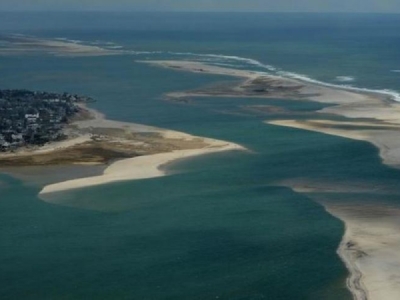
Posted on June 13, 2019
CHATHAM – It looks like the town will not be getting a northern harbor channel dredged this year that was meant to aid commercial fishing and U.S. Coast Guard vessels trying to reach the Atlantic from their mooring field and fishing pier.
Paul Revere III, the attorney representing Minister’s Point homeowner Gerald Milden, said Tuesday that his client will be appealing a decision by the state Department of Environmental Protection to allow the project, which would dredge approximately 10,000 cubic yards of sand to improve access to the northern inlet during low tide.
The sand was brought into the channel from the 2007 Patriots Day storm. Migrating sand has also virtually shut down the southern inlet.
?(A) request for an adjudicatory hearing could take a year, potentially longer,” Natural Resources Director Robert Duncanson told selectmen at their Monday meeting.
Milden had appealed the DEP’s original dredging permit issued to the town, specifically the order of conditions taken to minimize environmental and property damage. In a phone interview Tuesday, Revere said a new DEP decision hasn’t addressed his client’s concerns.
“This is improvement dredging and needs to be designed to minimize impacts on nearby coastal properties,” Revere said.
While the DEP superseding order covered Milden’s state appeal, Milden is also challenging the Chatham Conservation Commission approval and order of conditions under the town’s wetlands protection bylaw in Barnstable County Superior Court. That case is still awaiting a filing of evidence the commission used to make its determination, Revere said.
On Monday, Duncanson told selectmen that Chatham may look to expand the size of the area under the current dredge permit to the northern half of Chatham Harbor in an effort to give the town flexibility as it confronts the challenge of moving sand that is changing the pathways to the sea.
“Things are changing quickly. … We’re no longer ahead of the game,” Duncanson said.
Town officials are scheduling meetings with state and federal permitting agencies to discuss the process. The town has also started on survey work of species like horseshoe crabs that would limit where and when dredging and depositing of dredge materials could take place.
The town is also beginning outreach to officials in Harwich, Orleans and Eastham about a shared municipal dredge program that would be separate from the one operated by the county. The county dredge has been plagued by mechanical difficulties and aging equipment that caused it to cancel many of its projects this year.
Dredging is expensive work, with preliminary estimates from two companies to remove the 10,000 cubic yards of sand running between $300,000 and $500,000. Duncanson said the town will also study placing dredge spoils on the large tidal flats on Tern Island in the hope that the higher profile will help to protect some waterfront properties along the inner shore of the harbor.
Revere said it was hard to comment on plans he hadn’t yet seen. But, in principle, he said he believed dredging in areas west of a barrier beach tended to undermine its ability to retreat and reform, and thus protect homes from the open sea.
Source: capecodtimes.com





